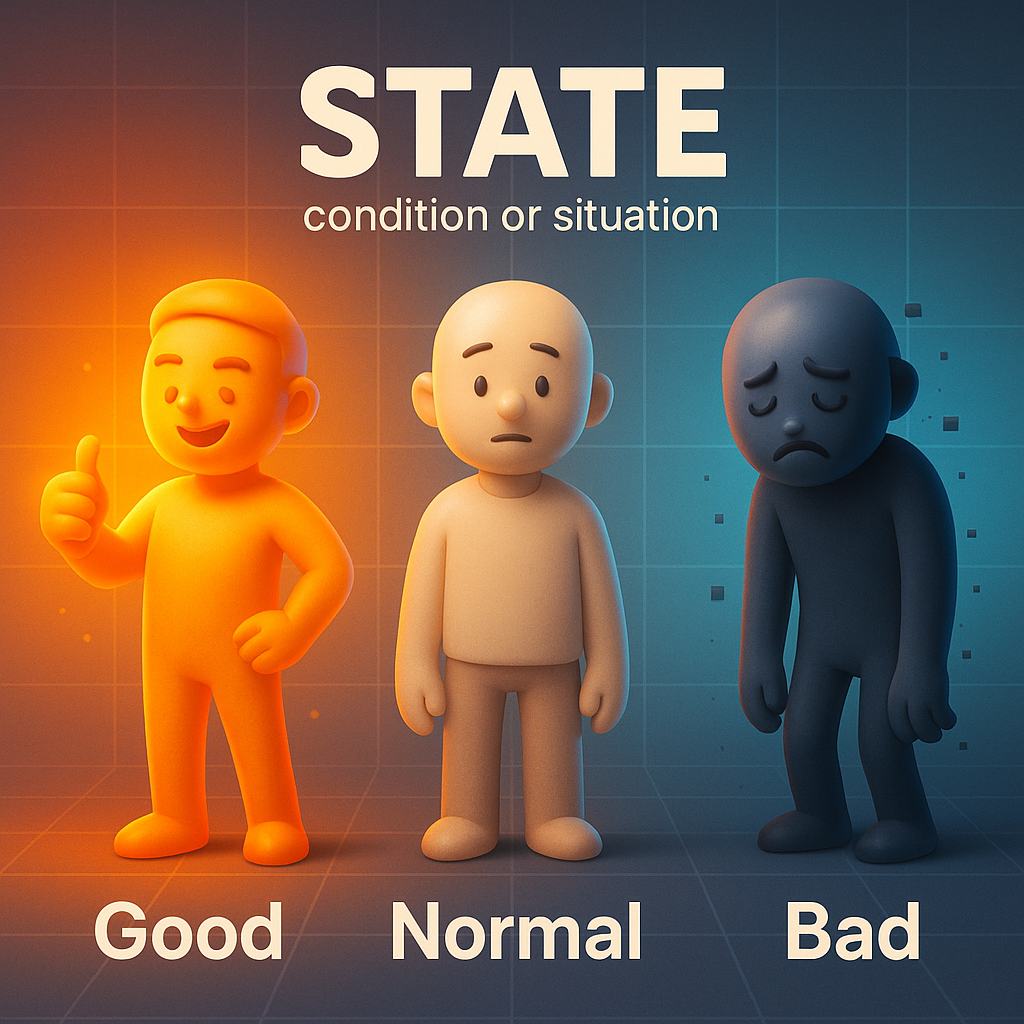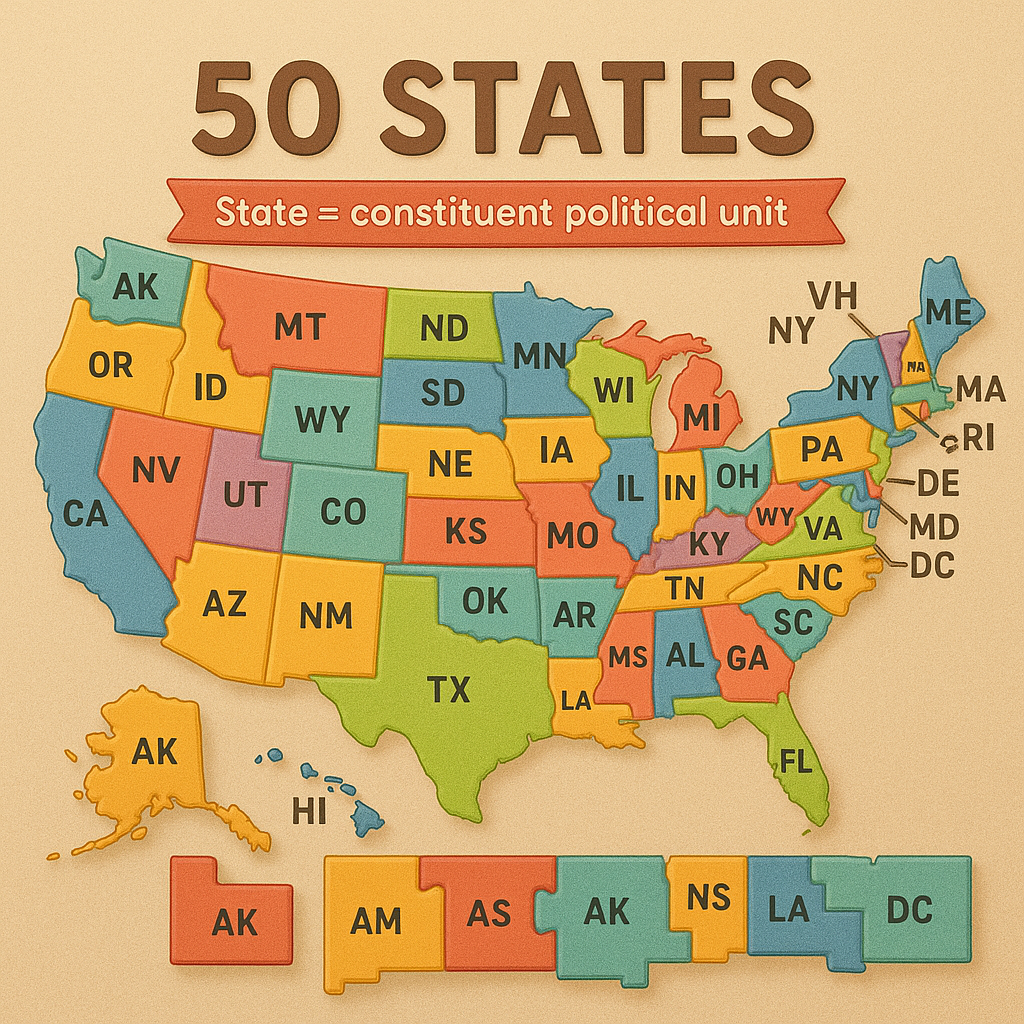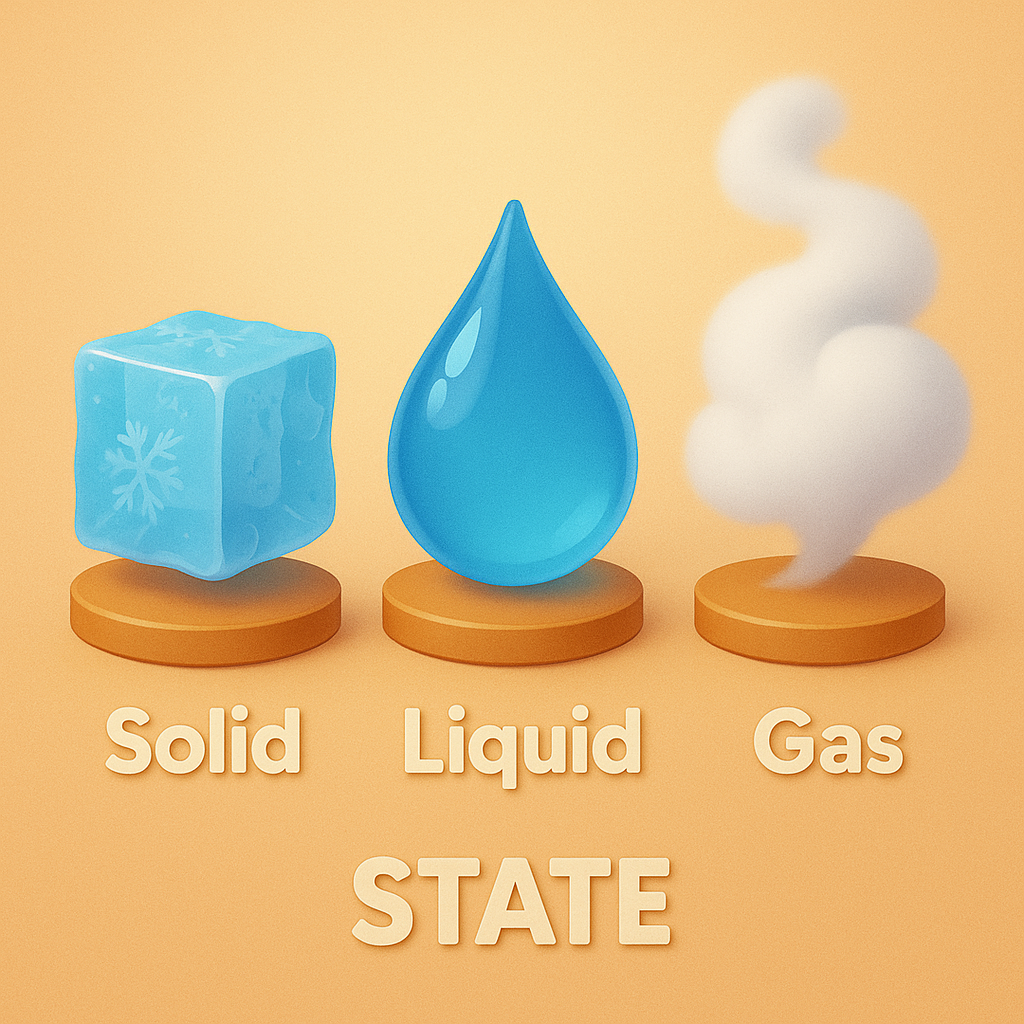State
Definition
The term "state" refers to a condition or situation, a politically organized body of people under a single government, or the act of expressing something in words.
Parts of Speech
- Noun
- Verb
- Adjective
Pronunciation
American English
- IPA Pronunciation: /steɪt/
- Respelling: STAYT
British English
- IPA Pronunciation: /steɪt/
- Respelling: STAYT
Etymology
The word "state" originates from the Latin "status," meaning "condition or position," which evolved through Old French "estat" and Middle English "state." It has been used to describe conditions, political entities, and verbal expressions.
Derivatives
- Statement (noun)
- Stateless (adjective)
- Statehood (noun)
- Overstate (verb)
- Restate (verb)
Synonyms
- Condition
- Situation
- Nation
Antonyms
- Chaos
- Confusion
- None
Usage
The term "state" is used across multiple contexts, such as describing conditions, nations, or verbal expressions. For example: "The water is in a frozen state," or "The United States is a federal state."
Related Terms
- Nation: A large group of people with common culture or history.
- Condition: The state of something with respect to its appearance or function.
- Declaration: A formal expression or announcement.
Detailed Definitions
Noun
- A condition or situation: Refers to the way something exists or functions at a given time.
- Example: "Her health is in a good state."
- A politically organized body: Refers to a nation or territory under one government.
- Example: "France is a European state."
- A physical form or phase: Refers to the form or condition of matter.
- Example: "Water can exist in a solid, liquid, or gaseous state."
Verb
- To express in words: Refers to the act of declaring or describing something.
- Example: "Please state your name for the record."
Adjective
- Relating to the government: Describes something associated with or controlled by a state or government.
- Example: "The state authorities are investigating the matter."
state



🇨🇳 Mandarin (Chinese)
- 状态 (State as in condition)
- IPA Pronunciation: /tʂʰaŋ˥˩tai̯˥˥/
- English Respelling: zhàngtài
- 国家 (State as in political entity)
- IPA Pronunciation: /kwo˧˥tɕiɑ˥˩/
- English Respelling: guójiā
🇮🇳 Hindi
- स्थिति (State as in condition)
- IPA Pronunciation: /st̪ʰiːt̪i/
- English Respelling: sthiti
- राज्य (State as in political entity)
- IPA Pronunciation: /ɾɑːd͡ʒjə/
- English Respelling: rajya
🇪🇸 Spanish
- Estado (State as in condition or political entity)
- IPA Pronunciation: /esˈtado/
- English Respelling: es-ta-do
🇫🇷 French
- État (State as in condition or political entity)
- IPA Pronunciation: /e.tat/
- English Respelling: e-tat
🇸🇦 Modern Standard Arabic
- حالة (State as in condition)
- IPA Pronunciation: /ˈħaːla/
- English Respelling: ha-lah
- دولة (State as in political entity)
- IPA Pronunciation: /ˈdawla/
- English Respelling: dow-lah
🇧🇩 Bengali
- অবস্থা (State as in condition)
- IPA Pronunciation: /ɔbʰɔst̪ʰa/
- English Respelling: obhastha
- রাষ্ট্র (State as in political entity)
- IPA Pronunciation: /ɹast̪ɹ/
- English Respelling: rastro
🇷🇺 Russian
- Состояние (State as in condition)
- IPA Pronunciation: /səstɐˈnʲijə/
- English Respelling: so-sto-ni-ye
- Государство (State as in political entity)
- IPA Pronunciation: /ɡəsʊˈdarstvə/
- English Respelling: go-su-darst-vo
🇵🇹 Portuguese
- Estado (State as in condition or political entity)
- IPA Pronunciation: /ɨʃˈtadu/
- English Respelling: e-sh-ta-du
🇮🇩 Indonesian
- Keadaan (State as in condition)
- IPA Pronunciation: /kɛ.a.dan/
- English Respelling: ke-a-dan
- Negara (State as in political entity)
- IPA Pronunciation: /nəɡara/
- English Respelling: ne-ga-ra
🇩🇪 German
- Zustand (State as in condition)
- IPA Pronunciation: /ˈt͡suːstand/
- English Respelling: zoo-stand
- Staat (State as in political entity)
- IPA Pronunciation: /ʃtaːt/
- English Respelling: shtaat
🇯🇵 Japanese
- 状態 (State as in condition)
- IPA Pronunciation: /d͡ʑoːtai/
- English Respelling: jo-tai
- 国家 (State as in political entity)
- IPA Pronunciation: /koku.ka/
- English Respelling: koku-ka
🇻🇳 Vietnamese
- Trạng thái (State as in condition)
- IPA Pronunciation: /cʈajŋ˨˩ˀ tʰaːj˧/
- English Respelling: trang thai
- Nhà nước (State as in political entity)
- IPA Pronunciation: /ɲaː˧ˀ ɲwəwk̚˦ˀ˥/
- English Respelling: nha nuoc
🇰🇷 Korean
- 상태 (State as in condition)
- IPA Pronunciation: /saŋtʰɛ/
- English Respelling: sang-te
- 국가 (State as in political entity)
- IPA Pronunciation: /kuk̚.k͈a/
- English Respelling: guk-ga
🇹🇷 Turkish
- Durum (State as in condition)
- IPA Pronunciation: /duˈɾum/
- English Respelling: du-rum
- Devlet (State as in political entity)
- IPA Pronunciation: /devˈlet/
- English Respelling: dev-let
🇵🇰 Urdu
- حالت (State as in condition)
- IPA Pronunciation: /ɦɑːlət̪/
- English Respelling: haalat
- ریاست (State as in political entity)
- IPA Pronunciation: /rɪˈjɑːst/
- English Respelling: riyaasat





